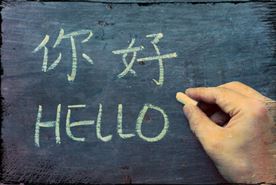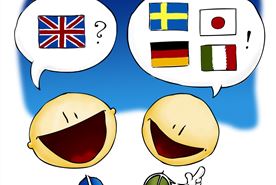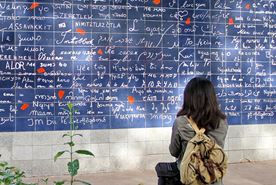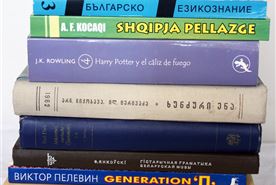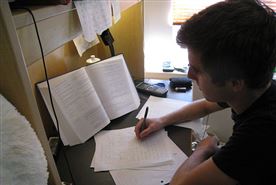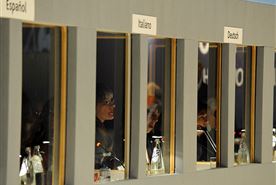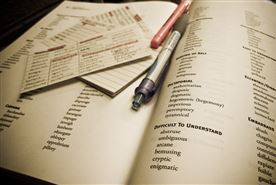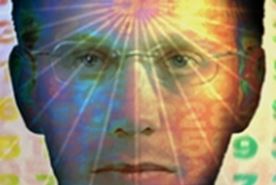YOLA 10: Hyperpolyglots - all
Noun
the study of language and of the way languages work
linguistics
In 1996, Dick Hudson, a professor of linguistics at University College London posted an email to a listserve for language scientists asking who held the world record for the number of languages they could speak.
In 1996, Dick Hudson, a professor of linguistics at University College London posted an email to a listserve for language scientists asking who held the world record for the number of languages they could speak.
Phrase
to meet or find something or someone by chance
come across
Replies listed the names of well-known polyglots, such as Giuseppe Mezzofanti, an 18th century cardinal. Then, in 2003, Hudson received an unexpected reply to his email from someone who had belatedly come across his question.
Replies listed the names of well-known polyglots, such as Giuseppe Mezzofanti, an 18th century cardinal. Then, in 2003, Hudson received an unexpected reply to his email from someone who had belatedly come across his question.
Noun
a journey on a boat or ship to a number of places as a vacation
cruise
When N was ten, he accompanied his grandfather on a cruise which took them to over twenty countries, from Venezuela to Hong Kong and Japan. N claimed that whatever port they visited, his grandfather knew the local language.
When N was ten, he accompanied his grandfather on a cruise which took them to over twenty countries, from Venezuela to Hong Kong and Japan. N claimed that whatever port they visited, his grandfather knew the local language.
Phrase
to think about or examine something
looking to
After a long silence, linguists and psychologists are now looking to hyperpolyglots for answers. Do these people possess extraordinary brains, or are they ordinary folk who do the extraordinary through motivation and effort?
After a long silence, linguists and psychologists are now looking to hyperpolyglots for answers. Do these people possess extraordinary brains, or are they ordinary folk who do the extraordinary through motivation and effort?
Adjective
contrary to reason or common sense
preposterous
In the discussion that followed Hudson's publication of N's claims, a reader disputed the Mezzofanti story, saying he found it absolutely preposterous, and pointing out how long it would take to learn 72 languages.
In the discussion that followed Hudson's publication of N's claims, a reader disputed the Mezzofanti story, saying he found it absolutely preposterous, and pointing out how long it would take to learn 72 languages.
Verb
to experience or undergo something
encountering
Assuming that each language has 20,000 words and that Mezzofanti could remember a word after encountering it once, he would have to learn one word a minute, twelve hours a day for five and a half years!
Assuming that each language has 20,000 words and that Mezzofanti could remember a word after encountering it once, he would have to learn one word a minute, twelve hours a day for five and a half years!
Verb
to continue having or doing something
maintaining
Herinda argues that maintaining this ability would take resources from other activities. But others see no reason why people should not be able to learn a huge number of languages.
Herinda argues that maintaining this ability would take resources from other activities. But others see no reason why people should not be able to learn a huge number of languages.
Phrase
to make (something) slower or more difficult
interfere with
Asked if there was any reason someone couldn't learn dozens of languages, Pinker replied: "No theoretical reason I can think of, except, eventually, interference; Similar kinds of knowledge can interfere with one another."
Asked if there was any reason someone couldn't learn dozens of languages, Pinker replied: "No theoretical reason I can think of, except, eventually, interference; Similar kinds of knowledge can interfere with one another."
Adjective
much better than average
exceptional
Stephen Krashen, from the University of California, maintains that exceptional language learners simply work harder, and have a better understanding of how they learn.
Stephen Krashen, from the University of California, maintains that exceptional language learners simply work harder, and have a better understanding of how they learn.
Noun
a person who translates the words that someone is speaking into a different language
interpreter
Krashen cites the case of Lomb Kato, a Hungarian interpreter who could speak 16 languages. Lomb felt she had no special talent for languages: she had taken classes in Chinese and Polish, but the others she taught herself.
Krashen cites the case of Lomb Kato, a Hungarian interpreter who could speak 16 languages. Lomb felt she had no special talent for languages: she had taken classes in Chinese and Polish, but the others she taught herself.
Noun
a part that someone or something has in a particular activity or situation
role
Others say that exceptional brains play a more significant role. In the 1980s, neurolinguist Loraine Obler of the City University of New York found a talented language learner she called 'CJ', who could speak five languages.
Others say that exceptional brains play a more significant role. In the 1980s, neurolinguist Loraine Obler of the City University of New York found a talented language learner she called 'CJ', who could speak five languages.
Noun
a quality that makes one person or thing different from another
trait
Some believe that there is also a genetic component to hyperpolyglottism, and evidence suggests that the trait runs in families. Unfortunately, it is difficult to get families to agree to subject themselves to a genetic study
Some believe that there is also a genetic component to hyperpolyglottism, and evidence suggests that the trait runs in families. Unfortunately, it is difficult to get families to agree to subject themselves to a genetic study


